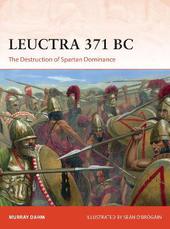
|
Leuctra 371 BC: The Destruction of Spartan Dominance
Paperback / softback
Main Details
| Title |
Leuctra 371 BC: The Destruction of Spartan Dominance
|
| Authors and Contributors |
By (author) Dr Murray Dahm
|
|
Illustrated by Sean O'Brogain
|
| Series | Campaign |
|---|
| Physical Properties |
| Format:Paperback / softback | | Pages:96 | | Dimensions(mm): Height 248,Width 184 |
|
| Category/Genre | Military history |
|---|
| ISBN/Barcode |
9781472843517
|
| Classifications | Dewey:938.06 |
|---|
| Audience | | General | | Professional & Vocational | |
|---|
|
Publishing Details |
| Publisher |
Bloomsbury Publishing PLC
|
| Imprint |
Osprey Publishing
|
| NZ Release Date |
20 July 2021 |
| Publication Country |
United Kingdom
|
Description
This detailed new study explores the battle of Leuctra and the tactics that ultimately led to the complete defeat of Sparta, and freed Greece from domination by Sparta in a single afternoon. The battle of Leuctra, fought in early July in 371 BC was one of the most important battles ever to be fought in the ancient world. Not only did it see the destruction of the Spartan dominance of Greece, it also introduced several tactical innovations which are still studied and emulated to this day. Sparta's hegemony of Greece (which had been in effect since the Persian wars of 480/79 and especially since the Peloponnesian War in 431-404 BC) was wiped away in a single day of destruction. Sparta would never recover from the losses in manpower which were suffered at Leuctra. The importance of the battle of Leuctra cannot be underestimated. This superbly illustrated title gives the reader a detailed understanding of this epic clash of forces, what led to it, its commanders, sources and the consequences it had for future civilizations.
Author Biography
Murray Dahm is a freelance historian and the author of Breaking the Spartans: Epaminondas, Pelopidas, and the Brief Glory of Thebes. He has written more than 50 articles for magazines such as Ancient Warfare, Medieval Warfare, and Ancient History. Murray lives in New South Wales, Australia.
ReviewsDahm's command of the source material is comprehensive and nuanced. He performs that most critical function in both history and law-enforcement/ intelligence work - source analysis. He is skeptical and careful in his appre- ciation of the sources, and reveals a deep understanding of the agendas and personal stories of the writers in question, applying this to his narrative and being sure to alert the reader to those inevitable points (most inevitable in ancient history) where the only data we have must be taken with a rather large grain of salt. -- Myke Cole * International Journal of Military History and Historiography *
|